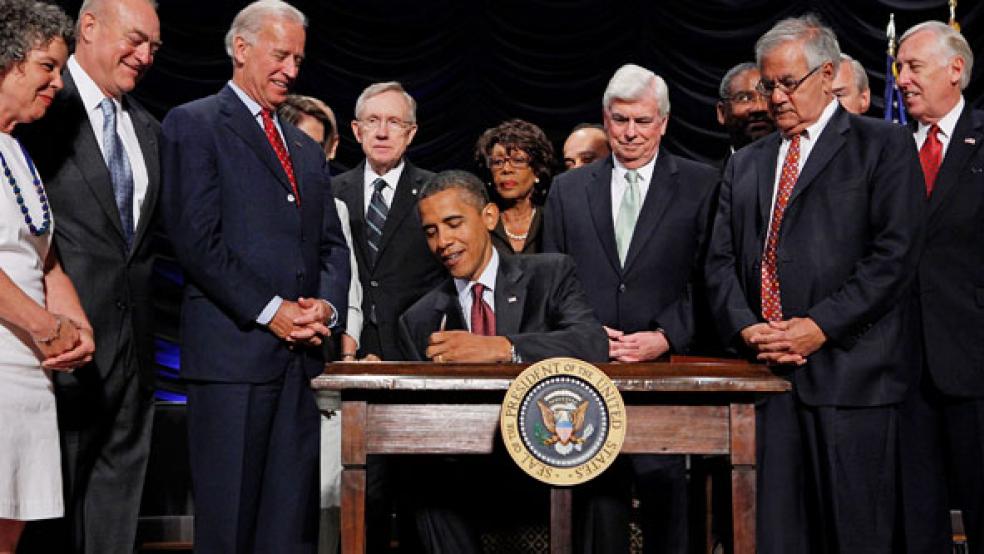The financial services Dodd-Frank reform bill placed its greatest restrictions on previously unregulated private-party derivatives, called financial weapons of mass destruction by Warren Buffett. Many analysts blame the mega-tonnage damage caused by the financial blowup of 2008 on unregulated two-party swaps tied to doomed-to-fail mortgage bonds, many of which were sold or backed by major investment banks and insurers like AIG.
Under the new law passed last year, banks and other major financial institutions that engage in two-party derivatives transactions will be required to register those trades, set aside capital for potential losses, and post margin for leveraged deals. None of it goes into effect until the rules are written, a cumbersome process in Washington involving months of notices and public comments.
This Wednesday, when the Commodity Futures Trading Commission holds the 14th in a series of meetings on Dodd-Frank implementation, the new rules will be unveiled with the intention of implementing them later this year.
But last week, Rep. Spencer Bachus, R.Ala., chairman of the House Financial Services Committee, and several colleagues introduced legislation that would delay rulemaking under Dodd-Frank for at least 18 months.
Specifically, the Alabama Republican, who raised more money from financial sector interests than any other member of the House in the last election cycle, proposed postponing enactment of new derivatives rules until mid-January 2013. For those not attuned to the political calendar, that’s a few weeks after the next inauguration, and about the time a new Congress will be sworn into office.
“The derivatives provisions of Dodd-Frank will impact every segment of the economy,” Bachus said in a press release. “The bill reflects the concerns of thousands of U.S. businesses, i.e., end users, that use derivatives to manage the risks they face every day.” The House Agriculture’s risk management subcommittee, chaired by Rep. K. Michael Conway, R-Tex., held a hearing in mid-April that aired similar complaints.
End users are companies or individuals who use derivatives to hedge the risks that arise during the normal course of business: a farmer who hedges against a sharp drop in price for his crops, for instance; or a manufacturer trying to lock in the price of steel; or any company trying to avoid currency losses from its dealings abroad. Dodd-Frank recognized the extra burden these businesses would face if required to post capital and margin for derivatives deals, so it exempted them from those requirements.
Lobbying groups in Washington, ranging from the U.S. Chamber of Commerce to the National Association of Manufacturers, are pushing for changes in the law. A companion bill to Bachus’ legislation, which was also introduced last week by freshman Republican Congressman Michael Grimm of New York, finally spelled out what those changes would be.
According to Grimm’s bill, neither party in a swaps deal would have to post margin if “one of the counterparties is not a swap dealer or major swap participant.” In other words, the major banks and financial institutions like AIG, whose failure posed a systematic risk to the entire financial system and required bailing out, would also be exempt from posting margin on leveraged deals, not just the farmer or steel-user or currency hedger.
“What they’re essentially doing here is making financial dealers end users,” said Michael Greenberger, a law professor at the University of Maryland who previously served as chief counsel at the CFTC under Brooksley Born, who tried but failed to regulate two-party swaps in the late 1990s. “It’s outrageous. It’s not the CFTC’s intent. And it’s not Dodd-Frank’s intent.”
Neither the Bachus nor Grimm bills are likely to receive a friendly reception in the Senate. But the intent of the relevant House oversight committees is finally clear, and that alone ought to make for a lively hearing tomorrow, which will be webcast here. You can also listen in by calling 866-844-9416.


